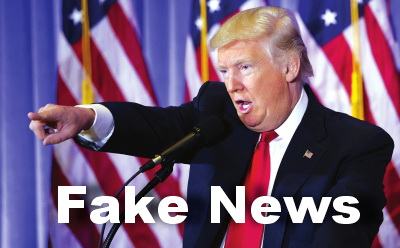


(File Photo/Xinhua)
Recently, POLITICO reported that US President Donald Trump’s “fake news mantra” is being adopted across the globe and blamed the US president for the growing outcry over Western media bias. The White House pushed back against the idea, calling the report “really ridiculous.” While the report is mostly focused on attacking Trump, it speaks to a larger truth about the Western media.
The US president’s criticism of the US media is well known across the globe. Trump has made numerous comments accusing his nation’s media of making up news out of thin air. “So much of our news is just made up-FAKE!” Trump once said. The US president routinely labels leading media outlets as mass producers of fake news and has called them the enemy of the people.
His dislike and distrust of the US media raises questions about the fairness of Western media reports. In describing his distaste for the media, Trump has repeatedly used the phrase “FAKE NEWS” online and also in numerous speeches and interviews. If a sitting US president argues that his nation’s leading media outlets are essentially fake news machines, then it is logical to assume that at least some of the outlets have political agendas.
Though Trump has blasted many media outlets, including The New York Times and The Washington Post, he has been especially critical of CNN, calling it, among other things, “disgustingly biased,” “fiction,” and “a disgrace to the broadcasting industry.” This “Fake News Network” image was reinforced after CNN wrongly reported a story about Donald Trump Jr. receiving an email on Sept. 4, 2016, that granted him special access to hacked WikiLeaks documents.
Immediately, the major “bombshell” story was promoted as “proof” that Trump and his team are tied to Russia. But the bombshell turned out to be fake news in its truest sense. And although CNN later acknowledged errors and corrected its story alleging contact between Trump Jr. and WikiLeaks, it only fueled claims that the Western media is biased.
Trump responded to the news by accusing “Fake News CNN” of a vicious and purposeful mistake. “They were caught red handed,” he added. The US president also accused the news network of lying to the American public with its slogan. “There are many outlets that are far more trusted than Fake News CNN. Their slogan should be CNN, THE LEAST TRUSTED NAME IN NEWS!” Trump said.
Then, before the dust settled, The Washington Post was accused of making up news after one of its reporters posted a photograph of an almost empty arena just hours before a Trump rally in Pensacola, Florida. “Demand apology & retraction from FAKE NEWS WaPo!” Trump said. The reporter later apologized and deleted the misleading photo from his personal account.
“Very little discussion of all the purposely false and defamatory stories put out this week by the Fake News Media. They are out of control - correct reporting means nothing to them. Major lies written, then forced to be withdrawn after they are exposed…a stain on America!” Trump said on Sunday.
In fact, the problem of fake news is nothing new to China. For years, China has long been on the receiving end of Western media bias. Rather than focus on China’s achievements in poverty alleviation and human rights or the benefits of stronger China-US relations for instance, China is often cast in a negative light and frequently attacked in the Western media. In addition, reports by official media are often dismissed as “propaganda” in order to discredit them.
All this shows that putting the Western interpretation of events on a pedestal is part of the fake news problem that China and other countries have been battling for years. If the President of the United States claims that his nation’s leading media outlets are a stain on America, then negative news about China and other countries should be taken with a grain of salt since it is likely that bias and political agendas are distorting the real picture.
 Fire brigade in Shanghai holds group wedding
Fire brigade in Shanghai holds group wedding Tourists enjoy ice sculptures in Datan Town, north China
Tourists enjoy ice sculptures in Datan Town, north China Sunset scenery of Dayan Pagoda in Xi'an
Sunset scenery of Dayan Pagoda in Xi'an Tourists have fun at scenic spot in Nanlong Town, NW China
Tourists have fun at scenic spot in Nanlong Town, NW China Harbin attracts tourists by making best use of ice in winter
Harbin attracts tourists by making best use of ice in winter In pics: FIS Alpine Ski Women's World Cup Slalom
In pics: FIS Alpine Ski Women's World Cup Slalom Black-necked cranes rest at reservoir in Lhunzhub County, Lhasa
Black-necked cranes rest at reservoir in Lhunzhub County, Lhasa China's FAST telescope will be available to foreign scientists in April
China's FAST telescope will be available to foreign scientists in April "She power" plays indispensable role in poverty alleviation
"She power" plays indispensable role in poverty alleviation Top 10 world news events of People's Daily in 2020
Top 10 world news events of People's Daily in 2020 Top 10 China news events of People's Daily in 2020
Top 10 China news events of People's Daily in 2020 Top 10 media buzzwords of 2020
Top 10 media buzzwords of 2020 Year-ender:10 major tourism stories of 2020
Year-ender:10 major tourism stories of 2020 No interference in Venezuelan issues
No interference in Venezuelan issues
 Biz prepares for trade spat
Biz prepares for trade spat
 Broadcasting Continent
Broadcasting Continent Australia wins Chinese CEOs as US loses
Australia wins Chinese CEOs as US loses